Music from afar thrills Shanghai audiences
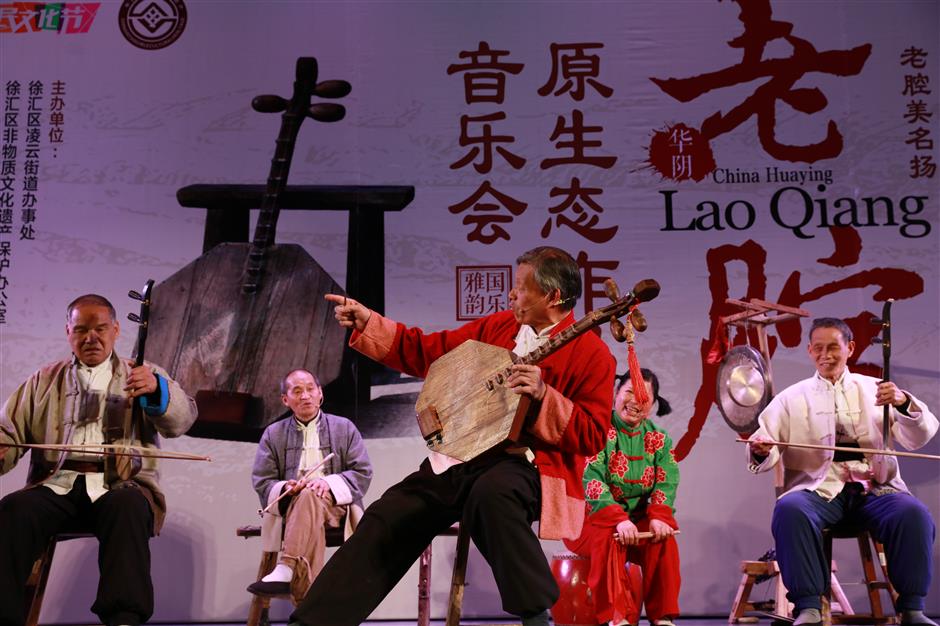
Artists from Shaanxi Province perform Huayin Laoqiang Opera at the “National Music and Elegant Rhythm” concert.
Jin Zhihong, director of the Xuhui District’s Intangible Heritage Office, is on a musical mission.
She wants Shanghai residents to appreciate the multitude of ethnic traditional music in China by listening to it being played live.
Jin and the other three officials in her office have invited folk musicians, mostly from remote mountainous villages in western China, to perform in Shanghai venues once a month.
Professors and experts from music institutions have also been invited to come to the city to discuss the culture and history of musical heritage. Videos, photos and descriptions of each event are being archived for future generations.
The project, titled "National Music and Elegant Rhythm," is part of the city’s government’s efforts to protect and preserve cultural heritage. It is jointly sponsored by Xuhui District Culture Bureau, which runs the heritage office, as well as Lingyun Subdistrict.
In the past two years, Jin’s office has organized over 70 "concerts plus lectures" at Meilong Cultural Center, Tou-Se-We Museum, and elementary and middle schools in Xuhui.
Compared with the pop music that younger people favor, China's traditional folk songs and music have long been marginalized in contemporary culture. Many are verging on extinction.
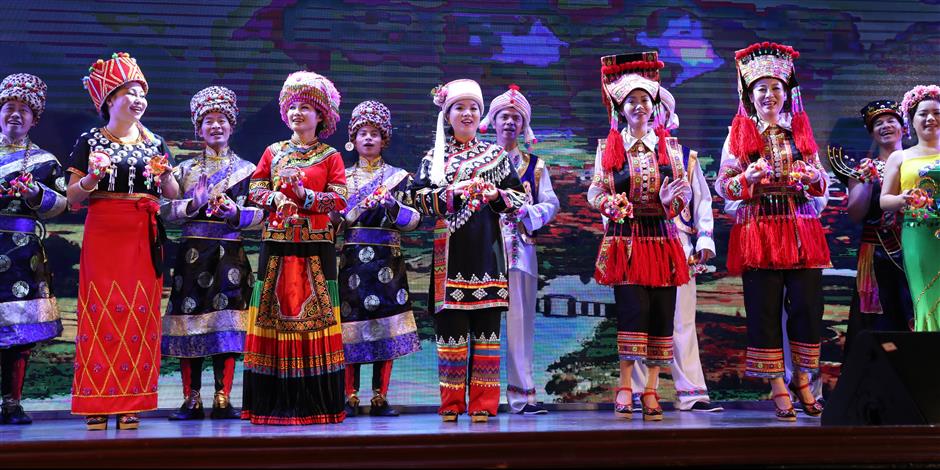
Artists perform the Poya Ge Shu, or Poya Song Book. The Zhuang ethnic group in Yunnan Province uses simple pictogram and written or painted symbols to help people to memorize ancient songs.
"These traditional arts are touching and inspiring, but many of them are little known,” Jin said. "They deserve better.”
Her enthusiasm originated when she took up lessons on the guzheng, or Chinese zither, as a child.
The ongoing series has been focusing on the music along ancient Silk Road routes in western regions of China. Among the performances to date are drum music from Xi'an in Shaanxi Province, "flat string" music from northwestern Qinghai Province, the harmonica from the Ningxia Hui Autonomous Region and the “tanbur” from the Xinjiang Uygur Autonomous Region.
Next month, the office will invite masters of “hua'er,” a listed art of multiple nationalities, including Han, Hui, Tibetan, Dongxiang, Sala and Yugu, to present a music festival at the Meilong cultural center.
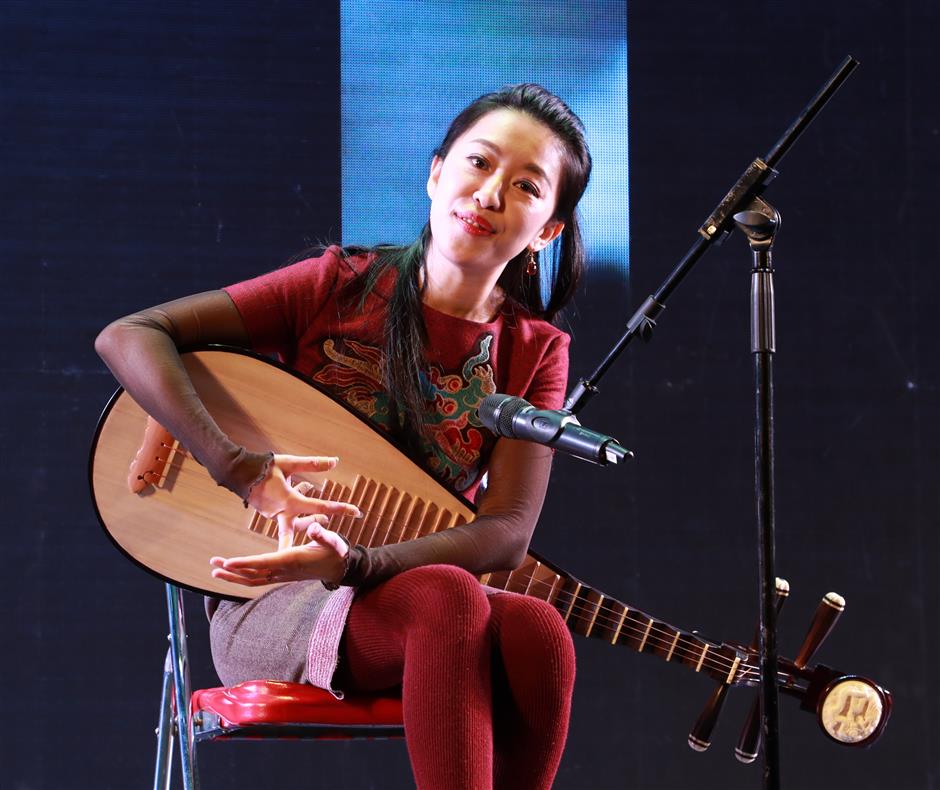
Renowned musician Zhao Cong, gives a lecture about the pipa (Chinese lute) while performing on the traditional instrument, which originated from the Qin Dynasty (221-206 BC) in northwest China.
Organizing such events isn’t easy. Jin and her colleagues must arrange everything from transport and accommodation to meals and venues for the artists. Many of the participants have never been outside their remote home regions, let alone flown in a plane.
Most of the flights are "red eye," not only to save the cost but also due to the scarcity of direct flights from some remote areas, said Ding Hui, an official in charge of transport and accommodation.
"When Jin first broached the idea of these folk concerts, we thought it was a mission impossible,” Ding said. “But we have managed somehow to make it work.”
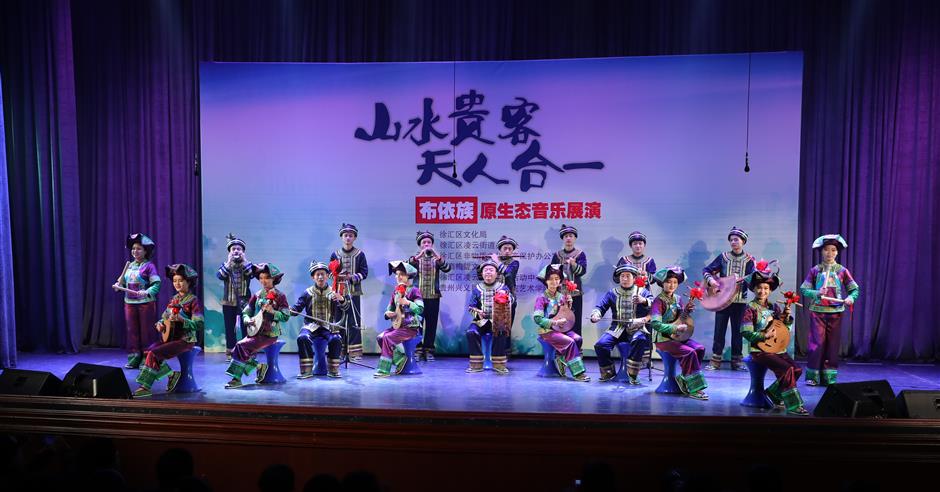
Artists of Buyi ethnic group perform a Bayin, or Eight Tones, a traditional performance of the ethic group.
Indeed, it did look pretty daunting when Jin printed a list of all the music-related national intangible cultural heritage and told her colleagues that she planned to invite them one after another to the city.
It proved to be a challenge to track down some of the artists who maintain a pretty low profiles thousands of kilometers from Shanghai. Finding them and then slotting them into Jin's monthly plan required a lot of schedule juggling.
In some cases, the ethnic musicians associated with a particular kind of music had abandoned their folk art to take up jobs as drivers or construction workers in order to make ends meet, according to Ding.
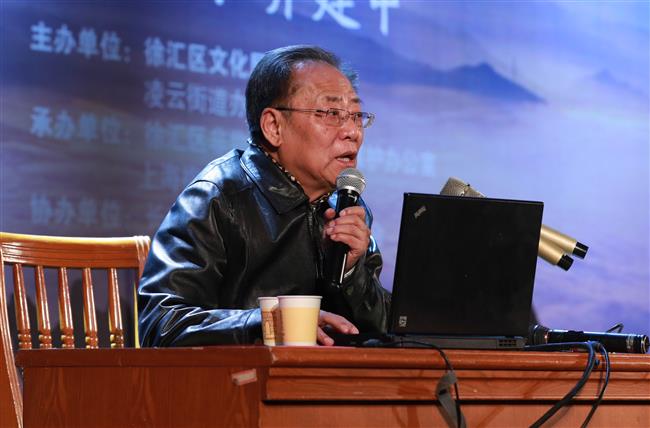
Qiao Jianzhong, president of the Chinese Council for Traditional Music and a professor at the Xi'an Conservatory of Music, gives a speech about China's intangible cultural heritage music.
Leading professors who do research in such traditional arts were helpful. Qiao Jianzhong, president of the Chinese Council for Traditional Music and a professor at the Xi'an Conservatory of Music, became an important supporter and ally for Jin’s team. He helped them find many minority artists in western China.
"Traditional music is an art that people won't forget after hearing it," Qiao said. "So, to bring the ‘primitive’ music from western China to Shanghai has a great impact. This project helps these musicians understand that their musical skills are valuable and appreciated."
He said he hopes Jin’s initiative will be duplicated in other parts of China.
After each performance, Jin and her colleagues take the visiting artists on a tour around Shanghai. It’s a cross-cultural part of the job that Jin enjoys.

Well-known musician Feng Mantian performs the Ruan, an ancient instrument originated from Tang Dynasty (618-907).
Nearly all the concerts so far have played to full audiences of diverse listeners, she said.
During one of the performances, a singer from Nujiang made an impromptu speech to thank Jin's team for the rare opportunity to perform in Shanghai. The audience was touched by his humbleness, and Jin said she burst into tears backstage.
Her office plans to compile all the video, photos and written archives into books and disks. These archives will surely become precious records of traditional heritage, Qiao said.
Tickets for the monthly concerts are available free via the WeChat account "Culture Xuhui" on whxh2014.















